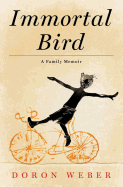
Immortal Bird begins with a simple moment of parental unease: Doron Weber senses that his 12-year-old son, Damon, is overdue for a growth spurt. Weber cannot help being extra-vigilant about his firstborn, a "blue baby" whose heart lacked a second ventricle, requiring two open-heart surgeries by the age of four. His father's worry proves grounded: Damon has developed protein-losing enteropathy (PLE), a rare, poorly understood and life-threatening post-surgical condition that causes vital protein molecules to leak out of the digestive system.
Weber, a program director for the Alfred P. Sloan Foundation, intersperses family vignettes with doctor appointments and short, well-parsed explanations as he investigates Damon's options. Even as the urgency of Damon's PLE intensifies, Weber finds moments of family joy and admires his son's determination to keep the hospital part of his life in the background. Excerpts from Damon's blog bring the teenager's witty and tough-tender voice into the memoir, including notes on filming his cameo on Deadwood and musings on how his health challenges might limit his goals for high school.
Immortal Bird's momentum and the author's prose style peak in the last third of the memoir, as the Webers end up battling an overstretched hospital and a villainously cavalier doctor. In the dramatic and unforgettable debacle that ensues, Damon and his parents achieve moments of devastating grace. By writing Immortal Bird, Weber has transformed his family's experience of medical strife into a work of art that teaches us how to advocate, how to love and how to transcend the unthinkable. --Holloway McCandless, blogger at Litagogo: A Guide to Free Literary Podcasts

